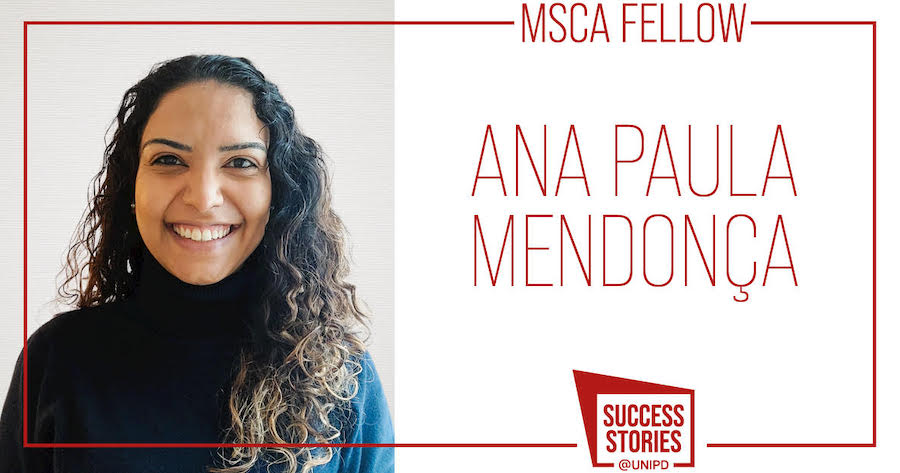
MSCA Fellow: Ana Paula Mendonça
Working in a multicultural environment is a challenge, but it will boost your open mind, diversity skills, and professional links.

Ana Paula Mendonça is a Brazilian fellow and obtained her Ph.D. in 2019 in biological chemistry at the Federal University of Rio de Janeiro (Brazil), where she worked on mitochondrial metabolism in brain cells under redox, metabolic, and social stress. In the last year of PhD (2018-2019), she did a one-year training at the University of Bremen (Germany) as a guest researcher funded by the German Academic Exchange Service (DAAD). She has been awarded a H2020-MSCA-2020 Individual Fellowship, PHERADOA, which focuses on identifying a pharmacological therapy that curtails ADOA visual loss.
Ana Paula, can you shortly explain your research project? Which are the main goals of your research?
My research project is dedicated to developing a pharmacological treatment for Autosomal Dominant Optical Atrophy (ADOA), a rare genetic disease that causes progressive and irreversible vision loss in both eyes starting in the first decade of life. ADOA is caused by mutations in the OPA1 protein gene. Currently, there is no available treatment for this condition.
This initiative not only aims to ease the suffering of ADOA patients, but can also shape the field of optical treatments. Through collaborative efforts between the Department of Biology and the Department of Pharmacy, this project represents a significant step towards innovative solutions for rare diseases and raises awareness for this community.
From Brazil, through Germany, to Italy… how did you manage to work at the University of Padua and why did you choose our Institution?
I finished my PhD in 2019 after spending a year in Germany, and so I applied for laboratories in Europe. I met Prof. Luca Scorrano, my MSCA supervisor, at a conference in Rio de Janeiro. We talked about my previous experience and my research interests and he suggested to participate in the MSCA Individual Fellowship call. I already knew Prof. Scorrano and the University of Padua from articles and the great mitochondrial hub you can find here, so I was very excited about the opportunity to join the team.
You work in a very young, dynamic and international team at the Department of Biology, at the Scorrano Lab. How important is to find a challenging and inclusive environment to implement the daily activities and develop the career of a researcher?
The most interesting characteristic of Prof. Scorrano’s group is how we complement each other with our differences. Working in a multicultural environment is a challenge, but it will boost your open mind, diversity skills, and professional links.
The MSCA IF projects are intended to be training-through-research projects: can you tell us something about your training? What is the role of your supervisor and how do you work together?
It is very important to have a mentor that supports your professional growth, and I am lucky to have a mentor that supports me in several trainings. My project consists in drug development with particles, so in these 2 years I had to learn more about drug development, nanoparticles, and analytical analysis. Moreover, by being involved in the Marie Curie Alumni Association (MCAA) – I am part of the MCAA Italy Chapter - I take the opportunity to access several other trainings and initiatives concerning open science principles, science diplomacy, and a career development programme.
You said you are part of the MCAA Italy Chapter, the Marie Curie Alumni Association, and you are often involved in communication and networking activities: how important is it for a researcher to create a community, develop a supportive team to share expertise and experiences?
Creating a community makes you create an interdisciplinary network. So, you can share knowledge, improve your communication skills, and bring others to collaborate. It changes the perspective of your project or even opens new possibilities for your career.
What are your plans for the future, after you finish the MSCA-IF fellowship?
The researcher's life, as we know, is very unstable. I have many interests; however, I am sure I still want to collaborate with science, advocate for rare diseases, and support science diplomacy.
What would you suggest to a researcher who is thinking about applying for a MSCA Postdoctoral Fellowship?
We scientists have one of the skills that I consider most important nowadays, which is an innovative mind. Therefore, I would suggest thinking about how you can bring innovation to solve global problems in your field of study.
International Research Office
via Martiri della libertà 8, 35137 Padova, Italy
tel. +39 049.827 1947 / 1948 / 1945
fax +39 049.827 1911
international.research@unipd.it


